| Article ID | Journal | Published Year | Pages | File Type |
|---|---|---|---|---|
| 6605381 | Electrochimica Acta | 2017 | 11 Pages |
Abstract
Graphite-supported α- and β-PbO2 electrodes (PbO2@G) were prepared by electrochemical deposition at appropriate potentials with regard to Pb(II)/PbO2 redox couple under alkaline and acidic conditions, respectively, for studying the direct electro-oxidation of ammonia in aqueous solutions. Results of surface characterization including scanning electron microscopy (SEM), X-ray diffractometer (XRD) and X-ray photoelectron spectroscopy (XPS) indicated the presence of polymorphs of PbO2@G. Cyclic voltammetry (CV) of the electrolyte containing NH3 indicated mediation of electron transfer by PbO2. At the onset potential of ca. +1.0 to +1.45 V (vs. Hg/HgO), a pathway of NH3 oxidation to nitrogen byproducts, namely, N2, NO2â, and NO3â was proposed. The removal efficiency and selective conversion of ammonia (0.1 M Na2SO4, pH 11, 25 °C) on PbO2@G was determined based on controlled potential experiments.
Related Topics
Physical Sciences and Engineering
Chemical Engineering
Chemical Engineering (General)
Authors
Yu-Jen Shih, Yao-Hui Huang, C.P. Huang,
